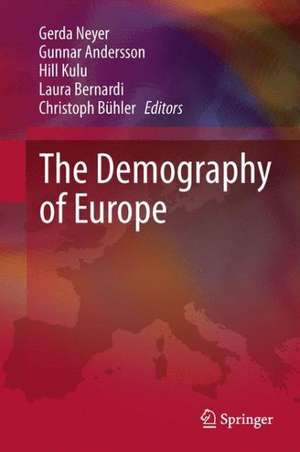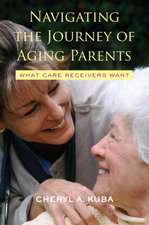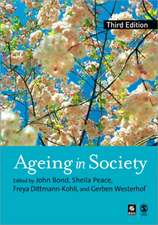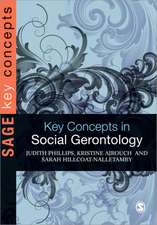The Demography of Europe
Editat de Gerda Neyer, Gunnar Andersson, Hill Kulu, Laura Bernardi, Christoph Bühleren Limba Engleză Hardback – 4 mai 2013
This book, derived from the symposium on “The Demography of Europe” held at the Max Planck Institute for Demographic Research in Rostock, Germany in November 2007 in honor of Professor Jan M. Hoem, brings together leading population researchers in the area of fertility, family, migration, life-expectancy, and mortality. The contributions present key issues of the new demography of Europe and discuss key research advances to understand the continent’s demographic development at the turn of the 21st century.
| Toate formatele și edițiile | Preț | Express |
|---|---|---|
| Paperback (1) | 941.68 lei 6-8 săpt. | |
| SPRINGER NETHERLANDS – 19 mai 2015 | 941.68 lei 6-8 săpt. | |
| Hardback (1) | 947.67 lei 6-8 săpt. | |
| SPRINGER NETHERLANDS – 4 mai 2013 | 947.67 lei 6-8 săpt. |
Preț: 947.67 lei
Preț vechi: 1155.69 lei
-18% Nou
Puncte Express: 1422
Preț estimativ în valută:
181.34€ • 188.11$ • 151.21£
181.34€ • 188.11$ • 151.21£
Carte tipărită la comandă
Livrare economică 27 martie-10 aprilie
Preluare comenzi: 021 569.72.76
Specificații
ISBN-13: 9789048189779
ISBN-10: 9048189772
Pagini: 236
Ilustrații: VI, 227 p.
Dimensiuni: 155 x 235 x 20 mm
Greutate: 0.51 kg
Ediția:2013
Editura: SPRINGER NETHERLANDS
Colecția Springer
Locul publicării:Dordrecht, Netherlands
ISBN-10: 9048189772
Pagini: 236
Ilustrații: VI, 227 p.
Dimensiuni: 155 x 235 x 20 mm
Greutate: 0.51 kg
Ediția:2013
Editura: SPRINGER NETHERLANDS
Colecția Springer
Locul publicării:Dordrecht, Netherlands
Public țintă
ResearchCuprins
The demography of Europe: Introduction: Gerda Neyer, Gunnar Andersson, and Hill Kulu .- Challenges for European family and fertility research: Peter McDonald.- Welfare states, family policies and fertility in Europe: Gerda Neyer.- Delaying parenthood in East and West Germany: A mixed-methods study of the onset of childbirth and the vocabulary of motives of women of the birth cohort of 1971: Karl Ulrich Mayer and Eva Schulze.- De-standardisation or changing life course patterns? Transition to adulthood from a demographic perspective: Johannes Huinink.- Europe, the oldest-old continent:Roland Rau, Magdalena M. Muszyńska, and James W. Vaupel.- Inequalities in life expectancy between and within European countries: Jacques Vallin.- The occupational mobility of return migrants: Lessons from North America: David P. Lindstrom.- Event-history analysis: Local dependence and cross-sectional sampling: Niels Keiding.
Textul de pe ultima copertă
Over the past decades Europe has witnessed fundamental changes of its population dynamics and population structure. Fertility has fallen below replacement level in almost all European countries, while childbearing behavior and family formation have become more diverse. Life expectancy has increased in Western Europe for both females and males, but has been declining for men in some Eastern European countries. Immigration from non-European countries has increased substantially, as has mobility within Europe. These changes pose major challenges to population studies, as conventional theoretical assumptions regarding demographic behavior and demographic development seem unfit to provide convincing explanations of the recent demographic changes.
This book, derived from the symposium on “The Demography of Europe” held at the Max Planck Institute for Demographic Research in Rostock, Germany in November 2007 in honor of Professor Jan M. Hoem, brings together leading population researchers in the area of fertility, family, migration, life-expectancy, and mortality. The contributions present key issues of the new demography of Europe and discuss key research advances to understand the continent’s demographic development at the turn of the 21st century.
This book, derived from the symposium on “The Demography of Europe” held at the Max Planck Institute for Demographic Research in Rostock, Germany in November 2007 in honor of Professor Jan M. Hoem, brings together leading population researchers in the area of fertility, family, migration, life-expectancy, and mortality. The contributions present key issues of the new demography of Europe and discuss key research advances to understand the continent’s demographic development at the turn of the 21st century.
Caracteristici
Presents and discusses key research advances in demographic development in contemporary Europe This book celebrates Jan Hoem's life as demographer This unique book covers issues of fertility, family formation, mortality, and migration













